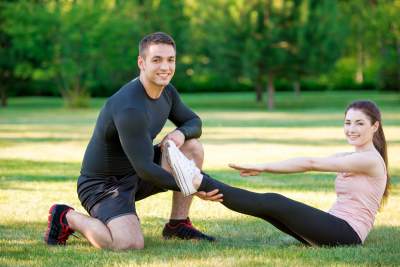
Tips for Preventing Muscle Soreness
27-03-2016 | Posted By: Admin | 2310 View(s)
No one likes to get out of bed in the morning after a heavy workout the previous day. The body becomes tense; muscles feel swollen and weaker added to ferocious hunger. You would feel that you never want to return to the gym again, but the muscle damage caused due to overtraining and the measures taken to recover are all a part of the preparation to become a better athlete. You must know the right steps and be aware of the tips for preventing muscle soreness so as to prevent injury, but the best part is, it is much easier and hassle-free than you may think.
Stop over exercising for Preventing Muscle Soreness:
There is growing evidence which suggests that moderate to high-intensity training which is performed regularly for over 90 minutes can have an adverse effect on the health in the forms of fatigue, chronic infections, allergic reactions, sleeplessness, digestive problems, and depression as well. When you continuously push your body to its endurance limit, it takes a toll on your performance, your overall health especially your cardiac muscle and you are invariably placed on a vicious cycle that leads to detrimental effects. Therefore, when it comes to exercise, moderate is better, more is disastrous.

Time for a Power Nap:
A short but intense span of a nap in the afternoon for about ten to thirty minutes can potentially restore the energy levels, improving the learning ability and performance. Research suggests that the power naps aids in entering a deeply restorative state that could be a valuable recovery mean following endurance training. So after your next workout, when you come home set the alarm for half an hour. It would be the time when you should listen to a meditative recording or snooze on the couch or relax in the massage chair before you prepare for your post workout meal.
Give yourself a Liquid Treat:
Post workout recovery fluids and shakes are a good way to make sure that your body is getting the nutrition it requires. Remember that water is, after all, the ultimate dehydrator and so drinking plenty of water is a must. It is recommended to avoid alcohol and caffeine as it dehydrates the body and increases muscle stiffness. After an intense exercise, a combination of carbohydrates and protein help in replenishing the muscles to gain back strength. So have organic egg whites, soy milk or whey protein supplements.

Stretching:
This should be your first line of defence after a session of brutal workout. While training, the muscles are contracted, and the fibres get much shorter. Therefore stretching them after a workout would promote mobility and allow for a more thorough recovery. But one of the Australian studies published claims that stretching can have no positive impact on the soreness of the muscle. But most fitness experts will not agree to this, and so you should opt for a few minutes of stretching that won’t hurt but soothe your tensed muscles.
Eat a heavy yet Balanced Meal:
Even when you are consuming food at a calorie deficit, you should ensure that you are getting the right amount of healthy proteins, fats, and carbohydrates- all of which play a commendable role in repairing sore muscles. In addition to that, consider having strategically-timed protein supplements. A few hours following the workout and while asleep are two times when the protein synthesis and muscle repair is increased. Therefore, a post- workout or pre-bedtime scoop of protein supplement makes sure that the body gets enough access to amino acids. Since amino acids are the bodybuilding blocks, therefore having them in the right quantities and at right times shall assure the fact that they will function properly when you require them.

Icing the sore muscles for Preventing Muscle Soreness:
Right after a heavy workout, you should ice the sore muscles to stave off inflammation. Though inflammation is one of nature’s greatest defence mechanisms, yet it immobilises you and causes significant discomfort. Thus, you should reduce the inflammation to free the sore muscles for moving that would promote healing. Just like stretching, its efficacy is also up for debate. While some researchers have claimed that icing could only heal injuries and not for soreness caused due to endurance training, yet it is a safe and easy option that anyone can opt for. Icing can accelerate the healing process without any adverse effects.
Massage the Inflamed Spots:
A recent study conducted by an Australian Fitness Centre reported that a light massage could help to tone down the inflammatory compounds known as cytokines and help in preventing muscle soreness. Myofascial release massage is gaining in popularity that aims at relaxing the connective tissue that covers the muscles. You may also hit these areas all by yourself with the help of a foam roller. Just put the roller on the floor and make use of the bodyweight for applying pressure and then roll back and forth for about a minute over the sore areas. But before doing this, assure yourself that you are properly hydrated, and your heart rate is back to its normal state. It is because while your muscles are warm and loaded with lactic acid massaging the sore spots can even worsen the scenario.
It is, therefore, important to understand the reasons for preventing muscle soreness and take proper precautions as they can lead to a lot of discomforts. As the saying goes, prevention is better than cure.


